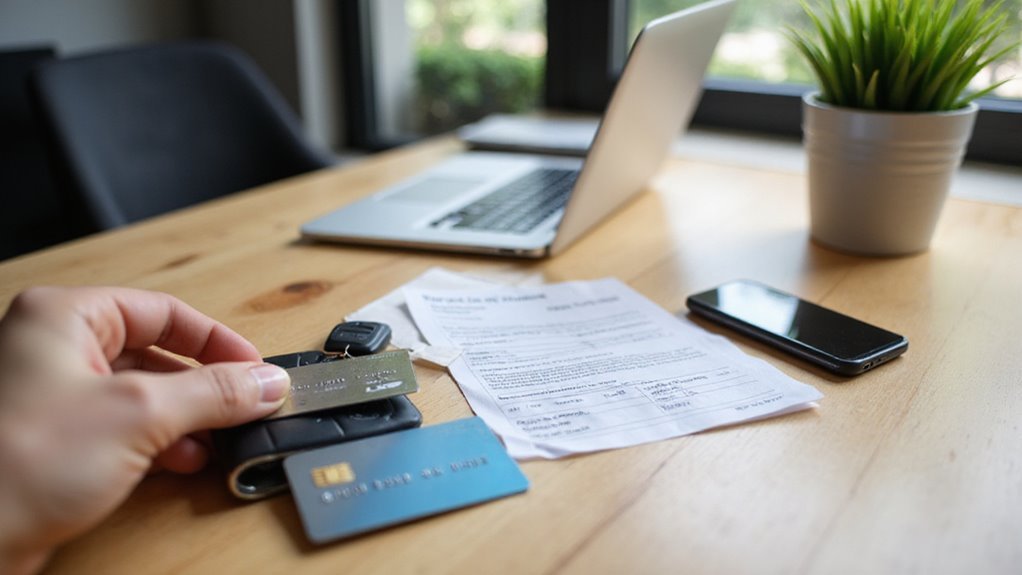


Many people find it tough to build credit from scratch. Without good credit, getting loans or even renting an apartment can be hard. Lenders want proof that you can pay them back, but how do you show this if you have no credit history?
This problem can feel frustrating and unfair. You may feel stuck or anxious about your future. Every small mistake can hurt you, making it even harder to get started. The system seems confusing and unforgiving for beginners.
But there is a clear way forward: You can build credit by starting small and making smart, consistent choices. This blog will break down each step so you can confidently build your credit and reach your financial goals.

Your credit score is important because it shows how reliable you are with money. Lenders, landlords, and some employers check your score. They use it to decide if you can get a loan, rent a home, or qualify for a job. A higher score can help you get better loan terms and lower interest rates.
Credit scores depend on a few key factors. Payment history shows if you pay bills on time. The amounts owed tell how much debt you have. The length of your credit history matters too. If you use different types of credit, your score may improve. Credit monitoring services can help you keep track of these changes and alert you to suspicious activity. Recent credit checks can also affect your score.
Different scoring models, like FICO and VantageScore, use these factors in their own way. Payment history and credit usage are important in most models. If you understand these basics, you can make choices that help your score. Good habits now will build a stronger credit future.
One essential thing to remember is that payment history is the single most important factor in determining your credit score.
You should review your credit report at least once a year to check for mistakes. Regular checks help you find errors and possible identity theft. If you spot a problem early, you can fix it before it causes harm. In addition to reviewing your report, you can add extra security measures like fraud alerts or credit freezes to protect your credit from unauthorized access.
Check these details when you read your credit report:
If you notice an error, it’s important to file a dispute online with the credit bureau to correct your report quickly. Careful credit checks help you protect your financial reputation. If your report is correct, you have a better chance to get credit in the future.

Start Free Credit Monitoring Now
When you open your first credit account, focus on selecting a card that matches your financial habits and goals. Scrutinize details like interest rates, annual fees, and rewards structures to ensure they align with your needs. Make sure you fully understand the account terms, including payment schedules and penalties, before you apply.
Starting with options like secured credit cards or credit builder loans can help you establish a positive credit history and demonstrate responsible financial behavior. During periods of rising inflation, being mindful of how increased costs could impact your ability to manage new credit accounts is especially important.
You need to pick the right credit card for your situation. Each card type has different features and rules. Secured cards, student cards, and cards for limited credit are good options for beginners. If you compare these options, you can find what fits you best. Check the interest rates, because they affect your payments if you carry a balance.
If you are applying, look at these factors:
You should select a card that matches your money habits and future plans.
Account terms explain how your credit account works. You should read and understand these terms before you open an account. Terms include the annual percentage rate (APR), fees, grace period, and payment due dates. If you miss a payment or go over your credit limit, you may pay penalty fees or higher interest. Lenders report these actions to credit bureaus, which can lower your credit score. Always look for hidden fees or special conditions. If you do not understand something, ask questions. Knowing these details helps you avoid mistakes and build good credit from the start.
Using credit cards responsibly helps you build a good credit history. Your credit history affects your chances of getting loans. Lenders check this history before approving loans or credit. Responsible use of cards shows you manage money well. Your credit utilization ratio, which is the percentage of your available credit you use, is a key factor in your credit score. You should keep your credit use below 30% of your card limit.
Regularly check your statements for mistakes or unusual charges. Avoid cash advances, as they usually have high fees. Limit how often you apply for new cards because many checks can lower your score. If you keep older credit accounts open, your credit score may rise.
It’s also important to pay bills on time, since your payment history makes up the largest portion of your credit score. Smart credit card habits can help you qualify for different loans in the future.

Paying bills on time is key to building good credit. Payment history is a big part of your credit score. Lenders see on-time payments as proof you are reliable. One late payment can lower your score a lot. Missed payments can stay on your credit report for years. You should use tools like automatic payments or reminders to avoid mistakes. If you check due dates and payments often, you can catch issues early.
If you pay bills late, your credit score may drop. Consistent on-time payments help you build a strong credit history. Timely payments are especially important because payment history is a major factor in determining your credit score and impacts your eligibility for better loan options. Maintaining responsible credit habits like these can help unlock better financial opportunities and savings over time.
Keeping your credit utilization low helps your credit score. Credit utilization means how much of your credit limit you use. Lenders look at this to see if you manage credit well. You should keep your utilization below 30%. Lower is better for your credit score. High utilization can make you seem risky to lenders.
You can check your balances often and spend less if needed. Paying your bill more than once a month can lower your balance. If you qualify, ask for a higher credit limit. Do not use all your available credit, even if you pay it off each month. Spread your purchases over different credit cards if possible. Many credit monitoring services offer real-time alerts that can help you stay informed about changes to your credit utilization and overall credit health.
For extra security while building credit, you may want to learn about credit freezes vs locks, which can help protect your credit information from unauthorized access.

When you become an authorized user on someone else’s credit card, the account’s history appears on your credit report, which can strengthen your score if the primary user manages it well. This strategy offers a fast track to building credit, but you need to weigh benefits against risks like missed payments or high balances impacting your profile.
Many lenders consider factors like credit history and utilization when assessing your creditworthiness, so being an authorized user can play a significant role in your financial opportunities. Make sure you fully understand the account holder’s habits before linking your credit to theirs. Before becoming an authorized user, it’s also important to review how APR and fees on the account could affect your overall borrowing costs and financial health.
Being an authorized user means you are added to someone else’s credit card. The account’s history appears on your credit report. You do not have to pay the debt, but you benefit from positive activity. This is different from a joint account, where both people are responsible for payments. The primary cardholder’s payment habits and credit use can help your credit score if they pay on time. A higher credit limit on the account can also lower your credit utilization ratio. Before becoming an authorized user, consider these factors:
Adding yourself as an authorized user can help you build your credit. You share the card’s payment history and credit limit. If the main user pays on time, your credit score may go up. A high credit limit can lower your credit use rate, which is good for your score. You do not need to qualify for your own card to start building credit. If the card has rewards, you may benefit from them too. This is a simple way to start a credit history. If the account is managed well, your credit can improve faster.
Becoming an authorized user can help build credit, but it also comes with important risks you should know about. Your credit can suffer if the main account holder misses payments. High balances on the account may lower your credit score. If you have a disagreement, you might lose access or face charges you did not make. Sharing personal information increases the chance of fraud. If someone misuses your details, identity theft is possible. Always consider these risks before you decide.

Diversifying your credit mix means having different types of credit accounts. Lenders want to see you can handle both loans and credit cards. If you show you can manage different accounts, it may help your credit score. You do not need to open every kind of account.
If you notice a gap in your credit mix, consider adding a new type of account. Only do this if you can manage another payment. A good mix of credit can make your credit history stronger over time. Adding additional security measures like credit monitoring services can also help you detect suspicious activity and further protect your credit as you build it.
You need to understand how hard pulls on your credit report can lower your score, especially if they occur frequently or within a short period. It’s essential to time your credit applications carefully so you don’t accumulate unnecessary hard inquiries. By being strategic, you protect your credit profile and increase your chances of approval on future applications.
Hard pulls happen when you apply for new credit. Lenders check your credit report during this process. Each hard pull can lower your credit score slightly. If you have many hard pulls close together, your score may drop more. Hard pulls stay on your credit report for two years. These inquiries need your consent before happening. Soft pulls are different and do not affect your score. You should watch your credit report for hard pulls. If you avoid many hard pulls, you protect your score. If you understand the difference between hard and soft pulls, you can manage your credit better.
The timing of your credit applications can affect your credit score. Each new application creates a hard inquiry on your credit report. Too many hard inquiries in a short period may lower your score. Lenders may view frequent applications as a risk. If you want to protect your score, apply for credit only when necessary.
Here is a quick guide for timing:
| Scenario | Recommendation |
|---|---|
| Applying for new cards | Wait at least 6 months |
| Requesting credit limit increase | Do this every 6-12 months |
| Earning credit card rewards | Limit to 2-3 per year |
| Shopping for loans | Apply within 30 days |
| Frequent applications | Avoid to protect score |
Spacing out your applications helps keep your score healthy. If you time your applications wisely, you can maximize benefits.
You should check your credit reports at least once a year. Regular checks help you find errors or suspicious activity early. If you monitor often, you can fix problems before they hurt your credit score. Use free annual credit reports and trusted credit monitoring services. Make sure your name, address, and Social Security number are correct. Check each account to spot any unfamiliar or wrong information. Review recent credit checks to ensure you approved them. Look at payment history to confirm all payments are shown correctly. If you see collections or public records that are not yours, report them. Regular monitoring helps you protect and manage your credit.
When you spot a mistake on your credit report, address it quickly to prevent lasting damage to your score. Start by identifying specific inaccuracies, such as outdated account statuses or unfamiliar inquiries. Gather supporting documents—like account statements or payment confirmations—to strengthen your dispute and ensure a thorough review by the credit bureau.
A single mistake on your credit report can cause serious problems. Errors can lower your credit score and raise your interest rates. If you apply for a loan, you might get denied because of a mistake. Credit report mistakes are more common than many people think. You should check your credit report for accuracy and consistency.
Look for these issues:
You should review each part of your report carefully. If you find a mistake, you need to fix it quickly. Accurate credit reports help you build and protect your credit.
You need evidence to dispute errors on your credit report. Credit bureaus require specific documents to review your claim. If you spot a mistake, select documents that support your case. For example, use bank statements for payment errors. Always attach your credit report with the error clearly marked. Organize your documents as shown below:
| Document Type | Purpose | Example |
|---|---|---|
| Bank Statements | Show payment history | PDF of transactions |
| Billing Statements | Confirm account details | Utility bill |
| Payment Confirmations | Prove timely payment | Email receipt |
| ID/Proof of Address | Verify identity | Driver’s license copy |
Well-organized evidence can improve your chances of a successful dispute.
Managing student and personal loans wisely helps build strong credit. Good loan management shows lenders you are responsible. Making payments on time improves your credit score. Missed or late payments can lower your credit score quickly. If you keep loan balances low, you reduce your debt risk. Check your loan terms and payment dates often. If you face money problems, contact your lender to discuss new payment options. Always review your loan accounts for mistakes. Pay off high-interest loans first to save money over time.
You can build credit without using a credit card. Credit-builder loans are one option. These loans keep your borrowed money in a secure account. If you make on-time payments, lenders report them to credit bureaus. Some apps also report your rent or utility payments to credit bureaus. If you use these apps, your regular payments can help build your credit. You could also become an authorized user on someone else’s credit card. If you take out a secured loan, your payments are reported just like with other loans. These methods help you build credit in a responsible way.
Setting long-term credit goals helps you plan for a strong financial future. These goals make it easier to buy a home, get good loan rates, and stay financially secure. You should start by checking your current credit situation. If you need help, talk to a credit counselor for advice. Paying off debt on time and in order is important. If your life or finances change, you may need to change your goals too.
If you consistently build good credit habits, your financial options will improve over time. Responsible credit use can help you secure better loan terms and lower interest rates. If you regularly check your credit report, you can catch errors early.
If errors do appear on your credit report, you should dispute them quickly. Good credit can lead to significant savings and easier approval for apartments or jobs. If you avoid late payments and keep balances low, your credit will likely improve.
If you want to stay on track, you should use tools to monitor your progress. The Finance Monitoring Guide can help you manage your credit and protect your financial future. Take charge of your credit journey today with the Finance Monitoring Guide.
Understanding what influences your credit score makes it much easier to interpret credit checks. Discover more insights and tips at the Finance Monitoring Guide.
(+1) 5165229807
info@financemonitoringguide.com
500 Marquette Ave NW, Suite 1200 Albuquerque, NM 87102 United States